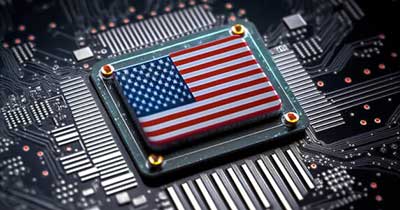Date: 28/03/2023
Relevance: GS-3: Effects of Liberalization on the Economy, Changes in Industrial Policy and their Effects on Industrial Growth.
Key Phrases: Chips for America Funding Opportunity, Rise of Protectionism in the US, Chips and Science Act, Semiconductors, state-led industrial policy, Supply-side economics, World Trade Organization.
Why in News?
- For decades, the US has been the leader of free trade. However, recent policies suggest a shift towards protectionism and an era of active state intervention in industrial and trade policies.
The Rise of Protectionism in the US
- The US has always been an advocate of free trade, but the most apparent rift in US-professed policies towards free trade is discernible from the Trump administration.
- Trump promised to reduce the US trade deficit with China and moved towards protectionism, reflecting the spirit of mercantilism.
- Similar policies continued under the Biden administration, and some new policy measures have been introduced, which possibly suggest the ushering of an era of even more active state intervention in industrial and trade policies in the US.
Chips for America Funding Opportunity
- In February 2023, the Biden government launched the first ‘Chips for America funding opportunity’ to incentivize US firms to manufacture semiconductors or chips domestically.
- The funding opportunity aims to provide fiscal incentives to construct, expand, or modernize commercial facilities for the production of semiconductors.
Shift from Decades-Old Manufacturing Dependency
- The ‘Chips and Science Act’ of August 2022, which operationalized the ‘Chips for America funding opportunity’, says that this is an “industrial strategy to revitalize domestic manufacturing, create good-paying American jobs, strengthen American supply chains, and accelerate the industries of the future.”
- For decades, US semiconductor firms have depended on countries like Taiwan, South Korea, and China to produce semiconductors.
- However, this policy aims to encourage domestic manufacturing of semiconductors, marking a radical change in how the industry has operated since the 1970s.
Why the change in stance?
- Job Losses:
- US job losses due to shifting of manufacturing to China, fuelled by low labour costs and massive production capacity, estimated to be over 3 million after China's entry into the World Trade Organization in 2001.
- Intellectual Property and Trade Secrets:
- US companies are concerned about protecting their intellectual property and trade secrets in China due to alleged theft of technology and patent violations by Chinese firms.
- China's government has been accused of forcing foreign companies to reveal their trade secrets to conduct business in the country.
- Dependence on Chinese Semiconductors:
- The US has become increasingly dependent on China for the production of semiconductors, which are critical components in many high-tech products.
- This dependence has raised concerns about national security, as well as the potential for China to use its control over the semiconductor supply chain as a tool of economic leverage.
- In recent years, the US has been trying to increase its domestic production of semiconductors in order to reduce its reliance on China.
- Countering the state-led industrial policy of China:
- The new ‘Chips and Science Act’ marks a possible ideological shift in the approach of the US policymakers towards industrial policy, and interestingly, this new shift in policy has driven to a large extent, to counter the state-led industrial policy of China.
- Supply Chain Disruptions During Covid-19:
- The Covid-19 pandemic has highlighted the vulnerabilities of global supply chains, especially those that rely heavily on production in China.
- These disruptions have led many countries to reassess their dependence on China for critical goods and materials.
Supply-side economics:
- Instead, ideologically they propagated supply-side economics where the role of the government is to act as a facilitator to improve the overall business environment, which should induce more private investment without directly supporting any particular industry.
- Though it can be argued that the US government has always played an important role in the US economy through its huge research and development expenditures, government purchases, and subsidy programs, it so far did not announce any explicit industrial policy helping specific industries.
WTO and free trade:
- The WTO regime was designed to take the world towards “freer trade,” and state intervention in industrial and trade policies was discouraged.
- WTO rules reduced the policy space available for late-industrializing developing countries to a large extent.
- While many developing countries, including India, have voiced their concern over this issue in WTO, the ideological support for free trade mainly came from the developed countries, particularly the US.
The future of the WTO:
- The stance of the US has changed since the Trump administration, and the return of industrial policy in the US may spell a very uncertain future for the WTO in the coming years.
- This is already foreshadowed by the US refusal to elect appellate body members in the WTO, which has crippled the dispute settlement mechanism of the WTO system.
Conclusion:
- The US's shift towards active state intervention in industrial and trade policies, as seen in the "Chips for America funding opportunity," marks a significant departure from its previous stance as a proponent of free trade.
- This ideological shift may have implications for the future of the WTO and could potentially reshape the global trade landscape.
Source: The Hindu BL
Mains Question:
Q. To what extent has the recent change in US policy towards industrial policy marked a departure from the country's earlier stance on free trade? Analyze the implications of this shift on the global trade order and the role of WTO.







